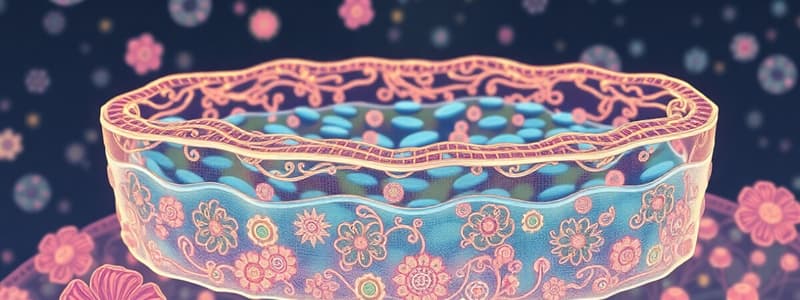Podcast
Questions and Answers
What are the two types of ends in a cell membrane molecule?
What are the two types of ends in a cell membrane molecule?
- Hydrophilic and Hydrophobic (correct)
- Embedded and Non-embedded
- Fluid and Stable
- Polar end and Non-polar end (correct)
What is the role of cholesterol molecules in the cell membrane?
What is the role of cholesterol molecules in the cell membrane?
Contributes to fluidity and stability of the cell membrane
The lipid layer of the cell membrane is completely impermeable.
The lipid layer of the cell membrane is completely impermeable.
False (B)
The two main functions of the lipid layer in a cell membrane are _____ and _____ stability.
The two main functions of the lipid layer in a cell membrane are _____ and _____ stability.
Flashcards are hidden until you start studying
Study Notes
Cell Membrane Structure
- Composed of a lipid bilayer featuring two distinct ends for each molecule.
- Polar ends are hydrophilic (water-attracting), allowing interaction with aqueous environments.
- Non-polar ends are hydrophobic (water-repelling), creating a barrier to water-soluble substances.
- Proteins are scattered throughout the lipid bilayer, playing crucial roles in cell signaling and transport.
Role of Cholesterol
- Cholesterol molecules are interspersed among phospholipids within the membrane.
- They enhance membrane fluidity, preventing it from becoming too rigid.
- Cholesterol contributes to overall stability, allowing membranes to maintain their structure under varying temperatures.
Functions of the Lipid Layer
- Acts as a semipermeable membrane, selectively allowing certain substances to enter or exit the cell.
- Oxygen, carbon dioxide, and water can easily diffuse through the lipid bilayer due to their small size and non-polar nature.
- The selective permeability is essential for maintaining homeostasis within the cell, regulating nutrient intake and waste expulsion.
Studying That Suits You
Use AI to generate personalized quizzes and flashcards to suit your learning preferences.




